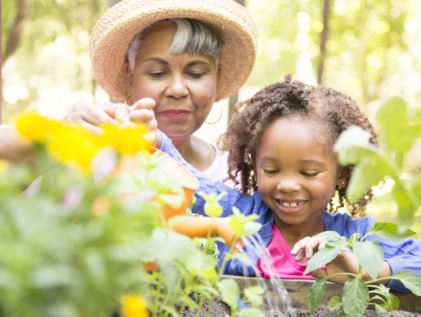The grandchild-to-grandparent relationship is so often a cherished one. However, challenges can crop up when young ones come up against grandparents’ behavioral changes, whether due to aging, illness, or both. Parents can struggle with preparing their kids for these changes or explaining why they’re happening in a way that isn’t confusing or upsetting.
Here are some strategies we’ve found helpful for families helping children to cope with their aging grandparents:
Communication is Key
Having open and honest conversations about how Grandpa might be acting is the most important part of the process. “If parents don’t tell their children what’s going on, they’re going to make up their own story,” says pediatric social worker Kris Nilsson. “You can’t protect your child by just not talking about it.” At the same time, find out how your child views the situation before launching into an explanation that might address concerns that don’t exist. Do this with open-ended questions like “Have you ever known someone who forgets things a lot?” or “How did you feel about Grandpa being crabby last Sunday?” These types of conversation-starters allow you to understand what’s worrying your child and allow her to articulate and unload worries that might be suppressed by well-meaning but preemptive reassurances on your part.
Keep Explanations Simple
Parents often give too much information when trying to prevent a child’s anxiety about a grandparent’s change in behavior or appearance. It’s better to aim for incremental conversations that allow for a gradual unfurling of information, as opposed to simply unloading. So, in the case of a medical event, for example, rather than launching into “Grandma had something called a stroke and won’t be able to talk when we see her today,” try an approach like “We’re going to visit Grandma, who might seem a little quiet today, but some smart doctors are helping her feel better. Let’s go give her a hug.” More details can come when and if needed, depending on the child’s age and state of mind.
Focus on the Positive
If Grandma’s not as alert as she used to be, that’s a real loss for a child who might be used to taking nature walks together, for example, or trips to the ice cream store. So, shift to activities your child can still do with her, like looking at books together, playing a card game, baking something simple, going through photo albums, or a jewelry box. If this kind of interaction isn’t an option, suggest concrete things your child might enjoy doing for Grandpa, like designing a card or writing a poem, painting a picture, or baking his favorite brownies to bring at the next visit.
If your family is dealing specifically with dementia in a grandparent, head to the National Institute on Aging for excellent resources on helping children of all ages cope with this disease.

